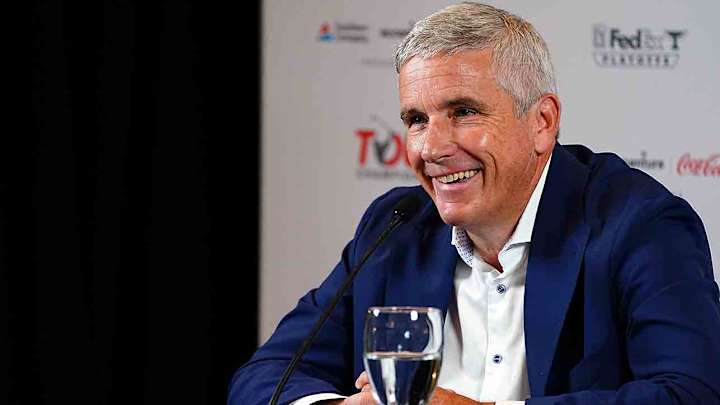In an Era of Increased Executive Compensation Scrutiny, Jay Monahan Got a Big Raise

Executive compensation comes under review when a company, usually a large multinational entity, pays its top executive more money than he or she could ever need.
When things are going well, such compensation is just a line item the board approves and shareholders pay little attention to, since they are likely also enjoying financial largesse, though perhaps not on such a grand scale.
It’s when the compensation number gets so large or the company is not doing so well that executive pay packages attract more scrutiny.
PGA Tour commissioner Jay Monahan runs a large nonprofit organization and while his players—or in this case shareholders—are making a good living, some of them might be wondering if Monahan’s overall 2022 compensation of $18.6 million was worth it.
That figure, reported by Sportico on Wednesday, was an increase of $4.7 million from 2021, when he made $13.9 million.
The number can be a bit misleading, with Monahan receiving base compensation of $ 1,791,409, bonus and incentive compensation of $9,220,031 and nontaxable benefits/other reported amounts of $173,789, bringing the total 2022 package to $11,185,229.
Only when you add deferred compensation of $7,435,628 does the total reach the reported $18,620,857.
It was during this period that the Tour was in the middle of costly litigation around LIV Golf, and according to Sportico the 2022 tax return shows a 10-time increase in legal fees to $20.7 million from $2 million in 2021.
The additional legal fees almost completely offset any additional revenue the Tour brought in during 2022, as its gross revenue was reported at $1.9 billion with costs of $1.87 billion, up from costs of $1.55 billion in 2021.
Players have long whispered under their breath that the compensation is too much for the commissioner, and his increase of 34% while the Tour was under siege may be viewed as a bridge too far.
According to a story Thursday in the Financial Times, shareholders are not as easy to sway when it comes to executive compensation, and that they often vote against many increased compensation proposals that are presented to them.
In the PGA Tour's case, the commissioner’s compensation is determined by the Management Development and Compensation Committee of the PGA Tour Policy Board and then voted on by the full board, a group of 11 that consists of six players and five independent directors.
The makeup of the board changed recently, with Tiger Woods joining and players now holding a majority.
Yet players are not involved in the commissioner's compensation process, unlike in major for-profit companies.
According to that Financial Times story, when Ford Motor Company attempted to boost compensation for executives by issuing more shares, BlackRock, State Street and Vanguard—investment houses owning the largest blocks of shares—voted against the ultimately failed proposal.
According to an Economic Policy Institute report, CEO compensation has grown by 1,209% since 1978, while the typical worker’s compensation has only ticked up 15%.
From July 2021 through June 2022, reportedly there were 20 failed compensation votes at S&P 500 companies, the most ever in a year's timeframe.
What if players voted on the compensation package for Monahan? Would it be the same?
As a player, how do you express your concerns with the direction of the Tour if you have no control over the compensation of the commissioner?
With the PGA Tour working towards establishing a for-profit entity with a combination of private equity money and PIF funds, it will be interesting to see how the compensation looks for Monahan in the future, as according to the framework agreement he will be heading up the new entity and will then have shareholders to deal with.

Alex Miceli, a journalist and radio/TV personality who has been involved in golf for 26 years, was the founder of Morning Read and eventually sold it to Buffalo Groupe. He continues to contribute writing, podcasts and videos to SI.com. In 1993, Miceli founded Golf.com, which he sold in 1999 to Quokka Sports. One year later, he founded Golf Press Association, an independent golf news service that provides golf content to news agencies, newspapers, magazines and websites. He served as the GPA’s publisher and chief executive officer. Since launching GPA, Miceli has written for numerous newspapers, magazines and websites. He started GolfWire in 2000, selling it nine years later to Turnstile Publishing Co.